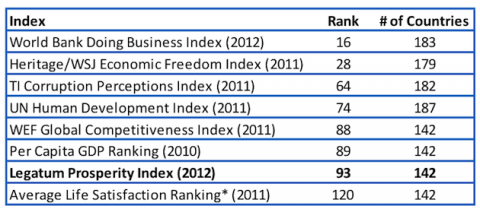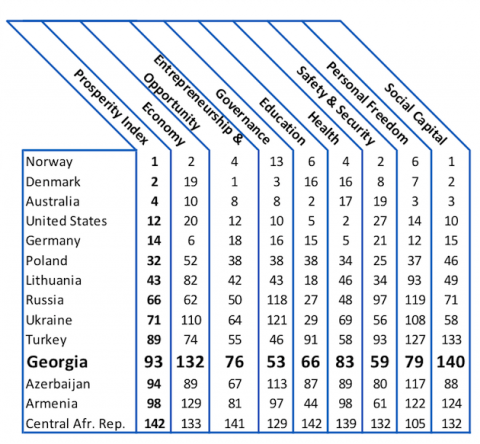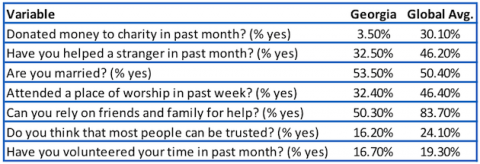 02
July
2024
02
July
2024
ISET Economist Blog
 Friday,
07
December,
2012
Friday,
07
December,
2012

 Friday,
07
December,
2012
Friday,
07
December,
2012
There are different ways to measure the success of nations. Various surveys are conducted and different indices are compiled to measure the well-being of countries across the world. Nowadays, there is an increasing interest to measure a country’s success not just in economic terms but far more broadly.
Fortunately, Georgia is getting better and better integrated into these types of comparative studies, giving us an idea of where we stand.
Table 1: Georgia’s recent rankings in a sample of surveys:

Legatum Prosperity Index 2012 is the one I will review today while focusing on the most interesting findings concerning Georgia’s ranking.
” Prosperity extends beyond just material wealth. It includes factors such as social capital, effective governance, human rights and liberties, health, opportunity, security, and overall quality of life.”
2012 was not the first time Legatum Prosperity Index was compiled, but it was the first time Georgia was included in the rankings. The rankings include 142 countries, with 32 countries added in 2012. Even though the index is dated 2012, most of the data come from previous years, mostly 2011.
Legatum Institute used some of the established theoretical and empirical research to identify the main determinants of prosperity. In total, the main index and its eight sub-indices are based on 89 selected variables. The eight sub-indices are Economy, Entrepreneurship & Opportunity, Governance, Education, Health, Safety & Security, Personal Freedom, and Social Capital.
Table 2: Georgia and a number of other countries in the Legatum Prosperity Index
 As we see, Georgia is doing relatively better in Governance, Safety & Security, and Education, while it ranks surprisingly low in Economy and Social Capital. The reader can see the detailed data on the Prosperity website. I will use the opportunity here to discuss the determinants of Georgia’s very poor performance in the Social Capital category and briefly go through a few key aspects of the economy sub-index.
As we see, Georgia is doing relatively better in Governance, Safety & Security, and Education, while it ranks surprisingly low in Economy and Social Capital. The reader can see the detailed data on the Prosperity website. I will use the opportunity here to discuss the determinants of Georgia’s very poor performance in the Social Capital category and briefly go through a few key aspects of the economy sub-index.
The Social Capital sub-index evaluates the strength of social ties, trust among individuals, and the effect of marriage and religious attendance on well-being.
“Social networks and the cohesion a society experiences when people trust one another have a direct effect on the prosperity of a country. …. the term “capital” in “social capital” highlights the contribution of social networks as an asset that produces economic and wellbeing returns.”
The Social Capital sub-index was compiled using 7 variables: Trust in Others, Perceptions of Social Support, Donations, Formal Volunteering, Helping Strangers, Marriage Rate, and Religious Attendance. The table below provides a more detailed description of these variables presenting the data for Georgia as well as the corresponding global averages.
Table 3: Social Capital Sub-Index Variables

Except for the marriage rate, Georgia is below the global average in all categories. The most surprising fact is that only half of Georgians think they can rely on friends and family for help. That’s really mind-boggling. Is it no longer true that Georgians have very special family ties and understand fully what true friendship is?
Surprisingly, according to Legatum Institute’s survey, instead of friends and family, Georgians tend to put their trust in financial institutions. There are 16 variables that determine the Economy sub-index. Trust in Financial Institutions is one category where Georgia exceeds the global average: in 2011, 77.5% of Georgians had trust in Financial Institutions while the global average stood at 60.9%. Almost all other variables demonstrate Georgia’s relatively poorer performance. For example, only 27.2% of Georgians are satisfied with the living standards compared to the global average of 62.8%.
Could it be that reliance on friends and family was understood by the respondents as financial reliance? Indeed, if your friends and family are as poor as you (or even poorer), you may consider them to be not particularly “reliable” in the strictly financial sense.
A general point to consider is that the global averages reported by Legatum Institute are overestimated as they are based on data from countries that are currently included in the rankings. Incidentally, countries that are left out are the ones that would potentially rank the worst. For instance, out of 32 countries that were for the first time included in the survey in 2012, only 1 is ranked among the top 20, while 11 are in the bottom 20.
It will be interesting to observe Georgia’s progress over time in Legatum Prosperity and other indices. Even more importantly, however, I hope that Georgia will indeed become a prosperous country where people trust each other and can rely on each other’s help, financially and otherwise. If that will be the case, we will not have to worry about any global indices. Until then, however, such indices help evaluate our progress and design better policies.
About the author:
Giorgi Papava belongs to the very first cohort of ISET graduates, the class of 2008. After graduating from ISET he decided to continue his education abroad; currently, he is a Ph.D. student at the University of Chicago, USA. He has always remained an active member of the ISET community and continues to contribute to the school’s academic and extracurricular activities.





